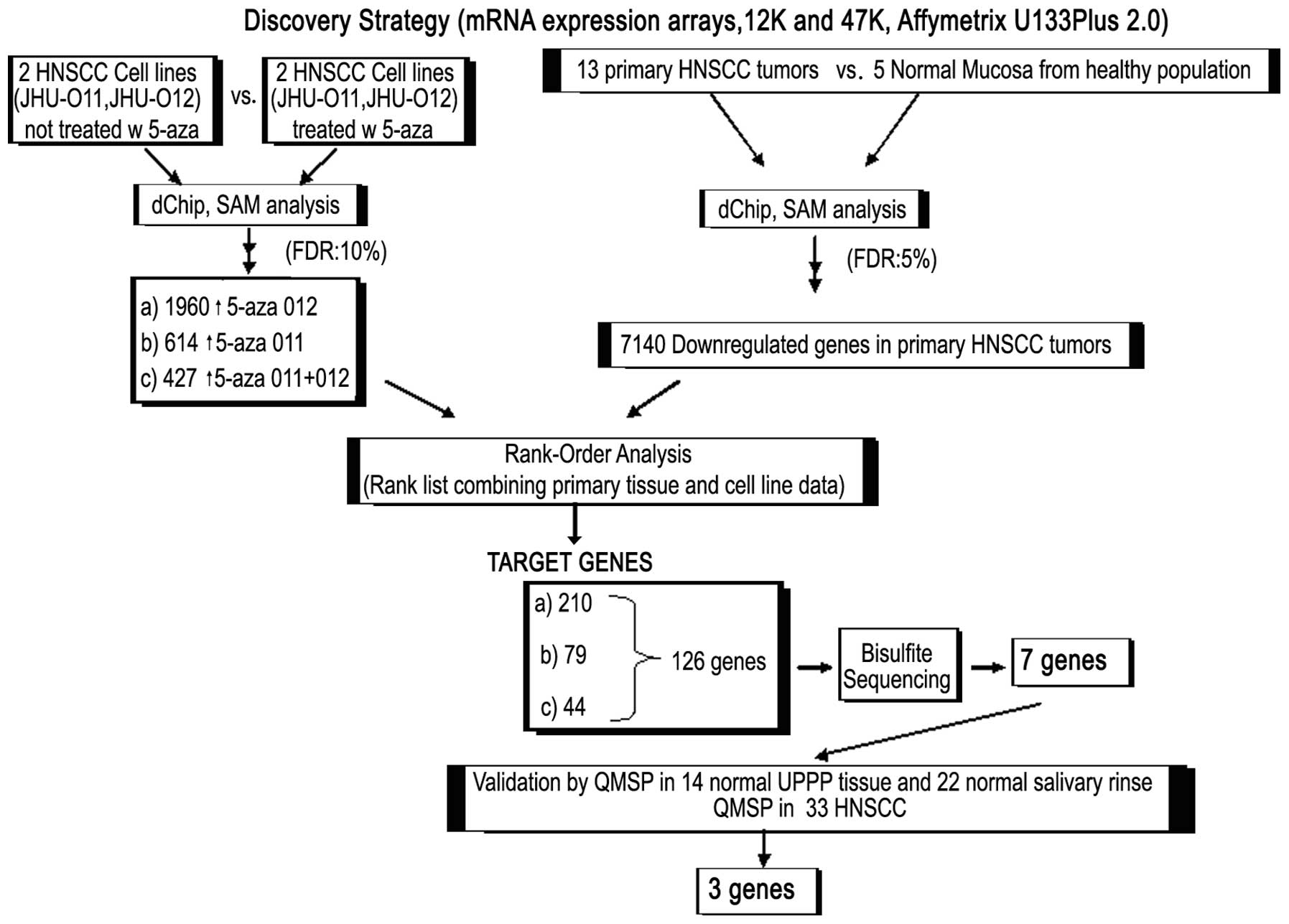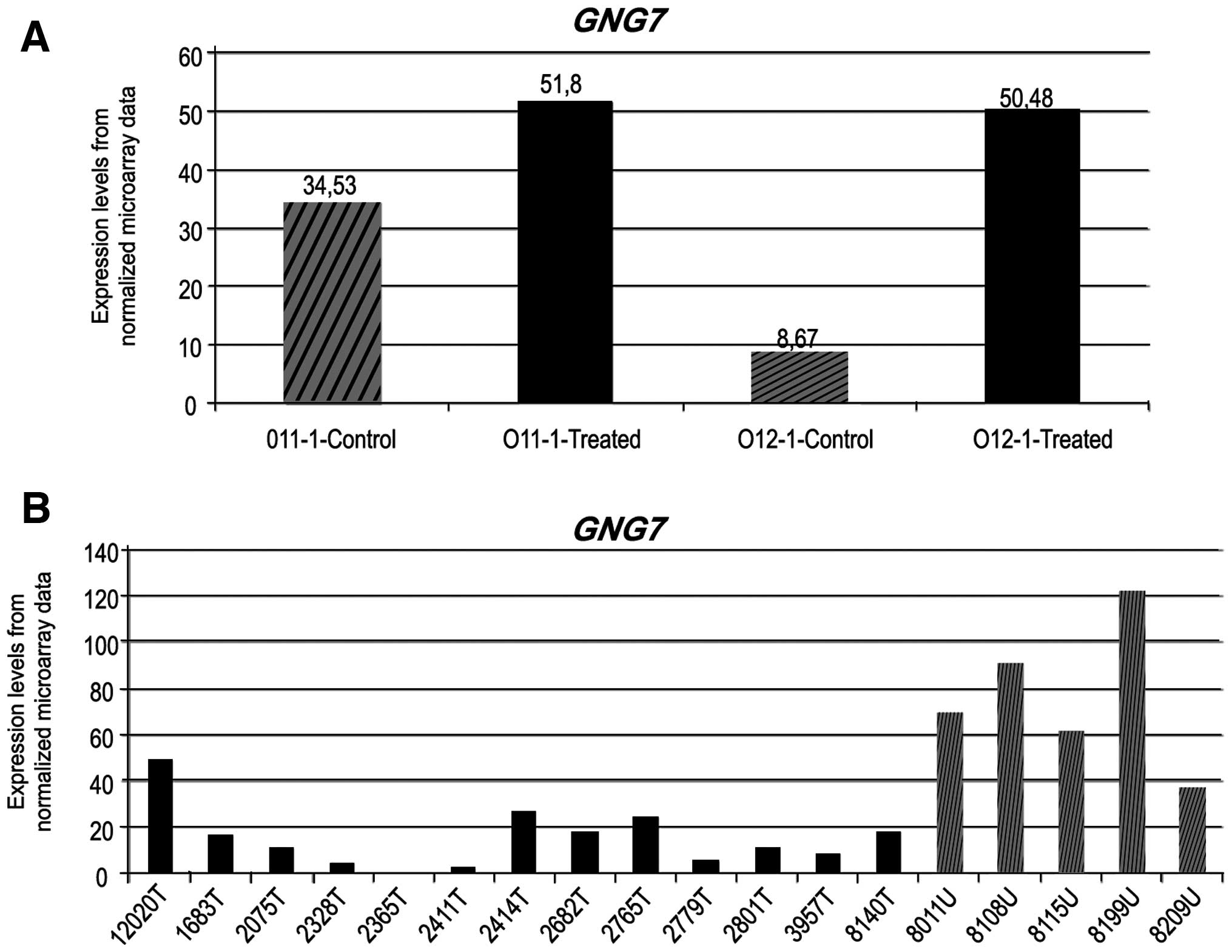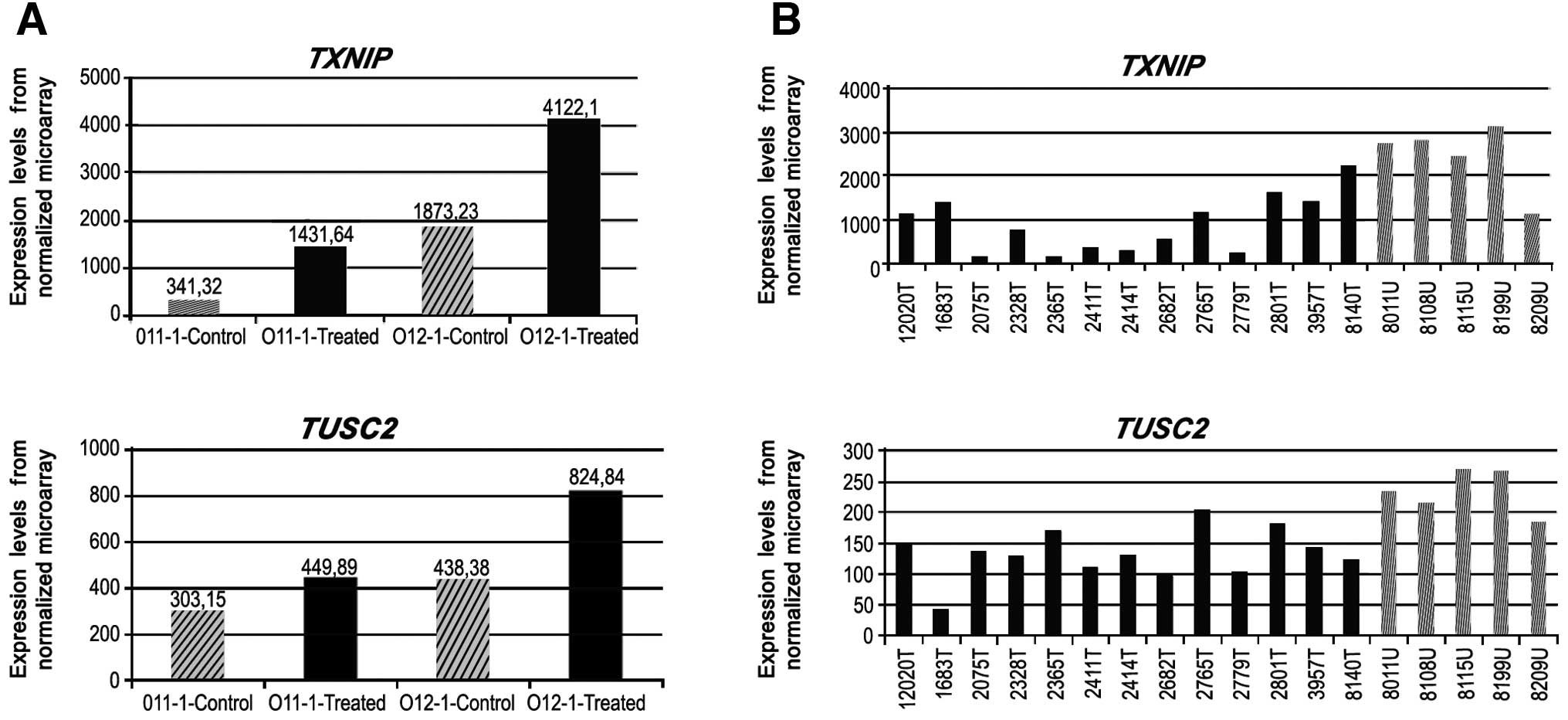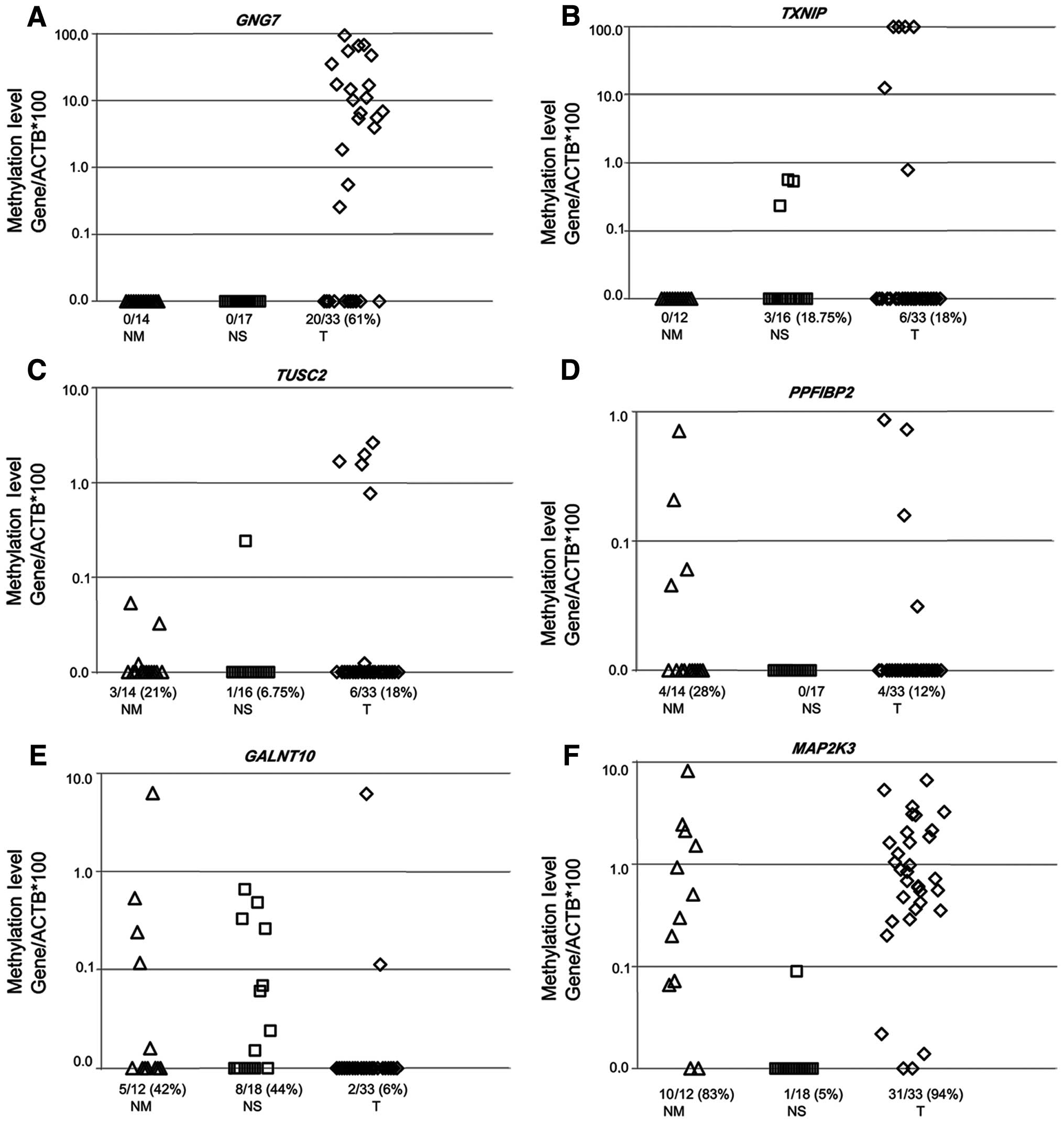|
1
|
Jemal A, Siegel R, Ward E, Murray T, Xu J,
Smigal C and Thun MJ: Cancer statistics, 2006. CA Cancer J Clin.
56:106–130. 2006. View Article : Google Scholar
|
|
2
|
Fearon ER and Vogelstein B: A genetic
model of colorectal tumorigenesis. Cell. 61:759–767. 1990.
View Article : Google Scholar : PubMed/NCBI
|
|
3
|
Baylin SB, Herman JG, Graff JR, Vertino PM
and Issa JP: Alterations in DNA methylation: a fundamental aspect
of neoplasia. Adv Cancer Res. 72:141–196. 1998. View Article : Google Scholar : PubMed/NCBI
|
|
4
|
Dulaimi E, Hillinck J, Ibanez de Caceres
I, Al-Saleem T and Cairns P: Tumor suppressor gene promoter
hypermethylation in serum of breast cancer patients. Clin Cancer
Res. 10:6189–6193. 2004. View Article : Google Scholar : PubMed/NCBI
|
|
5
|
Leonhardt H and Cardoso MC: DNA
methylation, nuclear structure, gene expression and cancer. J Cell
Biochem. 35(Suppl): S78–S83. 2000. View Article : Google Scholar
|
|
6
|
Herman JG and Baylin SB: Gene silencing in
cancer in association with promoter hypermethylation. N Engl J Med.
349:2042–2054. 2003. View Article : Google Scholar : PubMed/NCBI
|
|
7
|
Yamashita K, Upadhyay S, Osada M, et al:
Pharmacologic unmasking of epigenetically silenced tumor suppressor
genes in esophageal squamous cell carcinoma. Cancer Cell.
2:485–495. 2002. View Article : Google Scholar : PubMed/NCBI
|
|
8
|
Bernard PS and Wittwer CT: Real-time PCR
technology for cancer diagnostics. Clin Chem. 48:1178–1185.
2002.PubMed/NCBI
|
|
9
|
Eads CA, Danenberg KD, Kawakami K, Saltz
LB, Blake C and Shibata D: MethyLight: a high-throughput assay to
measure DNA methylation. Nucleic Acids Res. 28:E322000. View Article : Google Scholar : PubMed/NCBI
|
|
10
|
Cottrell SE and Laird PW: Sensitive
detection of DNA methylation. Ann NY Acad Sci. 983:120–130. 2003.
View Article : Google Scholar : PubMed/NCBI
|
|
11
|
Jerónimo C, Usadel H, Henrique R, Oliveira
J, Lopes C, Nelson WG and Sidransky D: Quantitation of
GSTP1 methylation in non-neoplastic prostatic tissue and
organ-confined prostate adenocarcinoma. J Natl Cancer Inst.
93:1747–1752. 2001.
|
|
12
|
Tokumaru Y, Yamashita K, Osada M, et al:
Inverse correlation between cyclin A1 hypermethylation and p53
mutation in head and neck cancer identified by reversal of
epigenetic silencing. Cancer Res. 64:5982–5987. 2004. View Article : Google Scholar : PubMed/NCBI
|
|
13
|
Li C and Wong WH: Model-based analysis of
oligonucleotide arrays: Expression index computation and outlier
detection. Proc Natl Acad Sci USA. 98:31–36. 2001. View Article : Google Scholar : PubMed/NCBI
|
|
14
|
Tusher VG, Tibshirani R and Chu G:
Significance analysis of microarrays applied to the ionizing
radiation response. Proc Natl Acad Sci USA. 98:5116–5121. 2001.
View Article : Google Scholar : PubMed/NCBI
|
|
15
|
Carvalho AL, Jeronimo C, Kim MM, et al:
Evaluation of promoter hypermethylation detection in body fluids as
a screening/diagnosis tool for head and neck squamous cell
carcinoma. Clin Cancer Res. 14:97–107. 2008. View Article : Google Scholar : PubMed/NCBI
|
|
16
|
Li LC and Dahiya R: MethPrimer: designing
primers for methylation PCRs. Bioinformatics. 18:1427–1431. 2002.
View Article : Google Scholar : PubMed/NCBI
|
|
17
|
Giefing M, Arnemann J, Martin-Subero JI,
et al: Identification of candidate tumour suppressor gene loci for
Hodgkin and Reed-Sternberg cells by characterisation of homozygous
deletions in classical Hodgkin lymphoma cell lines. Br J Haematol.
142:916–924. 2008. View Article : Google Scholar : PubMed/NCBI
|
|
18
|
Ray K, Kunsch C, Bonner LM and Robishaw
JD: Isolation of cDNA clones encoding eight different human G
protein gamma subunits, including three novel forms designated the
gamma-4, gamma-10, and gamma-11 subunits. J Biol Chem.
270:21765–21771. 1995. View Article : Google Scholar
|
|
19
|
Shibata K, Mori M, Tanaka S, Kitano S and
Akiyoshi T: Identification and cloning of human G-protein gamma 7,
down-regulated in pancreatic cancer. Biochem Biophys Res Commun.
246:205–209. 1998. View Article : Google Scholar : PubMed/NCBI
|
|
20
|
Ohta M, Mimori K, Fukuyoshi Y, et al:
Clinical significance of the reduced expression of G protein gamma
7 (GNG7) in oesophageal cancer. Br J Cancer. 98:410–417. 2008.
View Article : Google Scholar : PubMed/NCBI
|
|
21
|
Wang M, Gong B, Li Y and Wang Y: Human
G-protein gamma 7 in extrahepatic cholangiocarcinoma and its
clinicopathological significance. Hematol Oncol Stem Cell Ther.
3:66–70. 2010. View Article : Google Scholar : PubMed/NCBI
|
|
22
|
Wollman EE, d’Auriol L, Rimsky L, et al:
Cloning and expression of a cDNA for human thioredoxin. J Biol
Chem. 263:15506–15512. 1988.PubMed/NCBI
|
|
23
|
Meng L, Wong JH, Feldman LJ, Lemaux PG and
Buchanan BB: A membrane-associated thioredoxin required for plant
growth moves from cell to cell, suggestive of a role in
intercellular communication. Proc Natl Acad Sci USA. 107:3900–3905.
2010. View Article : Google Scholar : PubMed/NCBI
|
|
24
|
Nishiyama A, Matsui M, Iwata S, et al:
Identification of thioredoxin-binding protein-2/vitamin D(3)
up-regulated protein 1 as a negative regulator of thioredoxin
function and expression. J Biol Chem. 274:21645–21650. 1999.
View Article : Google Scholar : PubMed/NCBI
|
|
25
|
Han SH, Jeon JH, Ju HR, et al: VDUP1
upregulated by TGF-beta1 and 1,25-dihydroxyvitamin D3
inhibits tumor cell growth by blocking cell-cycle progression.
Oncogene. 22:4035–4046. 2003.PubMed/NCBI
|
|
26
|
Fischer WH and Schubert D:
Characterization of a novel platelet-derived growth
factor-associated protein. J Neurochem. 66:2213–2216. 1996.
View Article : Google Scholar : PubMed/NCBI
|
|
27
|
Kondo M, Ji L, Kamibayashi C, et al:
Overexpression of candidate tumor suppressor gene FUS1 isolated
from the 3p21.3 homozygous deletion region leads to G1 arrest and
growth inhibition of lung cancer cells. Oncogene. 20:6258–6262.
2001. View Article : Google Scholar : PubMed/NCBI
|
|
28
|
Ivanova AV, Ivanov SV, Prudkin L, et al:
Mechanisms of FUS1/TUSC2 deficiency in mesothelioma and its
tumorigenic transcriptional effects. Mol Cancer. 8:912009.
View Article : Google Scholar : PubMed/NCBI
|
|
29
|
Zhou YB, Huang ZX, Ren CP, Zhu B and Yao
KT: Screening and preliminary analysis of the apoptosis- and
proliferation-related genes in nasopharyngeal carcinoma. Nan Fang
Yi Ke Da Xue Xue Bao. 29:645–647. 2009.(In Chinese).
|
|
30
|
Lerman MI and Minna JD: The 630-kb lung
cancer homozygous deletion region on human chromosome 3p21.3:
identification and evaluation of the resident candidate tumor
suppressor genes. The international lung cancer chromosome 3p213
tumor suppressor gene consortium. Cancer Res. 60:6116–6133.
2000.
|
|
31
|
Uno F, Sasaki J, Nishizaki M, et al:
Myristoylation of the fus1 protein is required for tumor
suppression in human lung cancer cells. Cancer Res. 64:2969–2976.
2004. View Article : Google Scholar : PubMed/NCBI
|
|
32
|
Prudkin L, Behrens C, Liu DD, et al: Loss
and reduction of FUS1 protein expression is a frequent phenomenon
in the pathogenesis of lung cancer. Clin Cancer Res. 14:41–47.
2008. View Article : Google Scholar : PubMed/NCBI
|
|
33
|
Hennessey PT, Ochs MF, Mydlarz WW, Hsueh
W, Cope L, Yu W and Califano JA: Promoter methylation in head and
neck squamous cell carcinoma cell lines is significantly different
than methylation in primary tumors and xenografts. PLoS One.
6:e205842011. View Article : Google Scholar : PubMed/NCBI
|


















